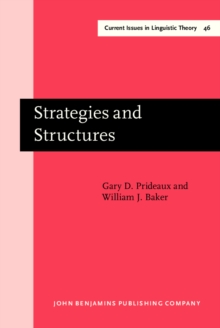
Invariance, Markedness and Distinctive Feature Analysis : A contrastive study of sign systems in English and Hebrew PDF
by Tobin Yishai Tobin
Part of the Current Issues in Linguistic Theory series
Description
This volume provides a new kind of contrastive analysis of two unrelated languages — English and Hebrew — based on the semiotic concepts of invariance, markedness and distinctive feature theory.
It concentrates on linguistic forms and constructions which are remarkably different in each language despite the fact that they share the same familiar classifications and labels. Tobin demonstrates how and why traditional and modern syntactic categories such as grammatical number; verb tense, aspect, mood and voice; conditionals and interrogatives; etc., are not equivalent across languages.
It is argued that these so-called universal concepts function differently in each language system because they belong to distinct language-specific semantic domains which are marked by different sets of semantic features. The data used in this volume have been taken from a wide range of both spoken and written discourse and texts reflecting people's actual use of language presented in their relevant linguistic and situational contexts.
Information
-
Download - Immediately Available
- Format:PDF
- Pages:428 pages
- Publisher:John Benjamins Publishing Company
- Publication Date:15/12/1994
- Category:
- ISBN:9789027276742
Information
-
Download - Immediately Available
- Format:PDF
- Pages:428 pages
- Publisher:John Benjamins Publishing Company
- Publication Date:15/12/1994
- Category:
- ISBN:9789027276742










